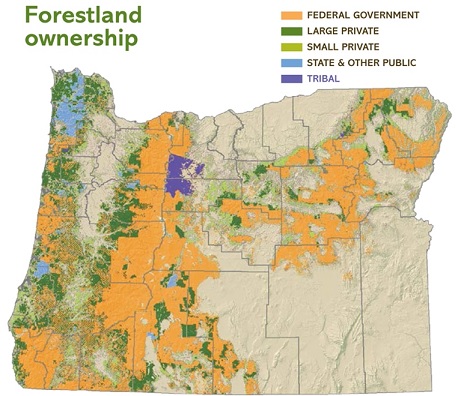Oregon is a big part of the nation's wood basket
Nick Smith is communications director for the American Forest Resource Council, a group founded in 2013 advocating forest management on federal lands. Based in Portland, the group serves the western states of Oregon, Washington, California, Idaho and Montana. Previously, Nick worked in the Oregon House under six Representatives. He recently gave a talk focused on forest fires, their causes, effects and solutions.
Oregon is a big part of the nation's wood basket. One million acres of forest burned in Oregon in 2020. The air was fouled, land denuded, watershed quality severely impacted, tree destroying insect infestations greatly expanded, wildlife and their habitat destroyed. Humans and domestic animals lives were threatened, homes were burned to total loss, forestry job opportunities were lost, lumber production diminished, scenic and recreational opportunities erased.
Neither stewards of the land nor environmentalists -- two groups normally at odds -- claimed a positive side to these outcomes. The conditions leading to these fires were mostly preventable. Forest management has the tools to greatly mitigate the incidence of forest fires. The tools can’t prevent drought, lightening and high winds. The tools are logging, thinning, creation of fuel breaks, firefighting with maintained access roads and rapid replanting.
Comparing private timber holdings to federal lands reveals a sharp contrast in outcomes. Planned, controlled forest fires destroy little marketable timber and have smaller environmental impacts which mimic natural cycles. Catastrophic fires have no positive outcomes. With private forests, owners effect forest management policies. Their planning spans activity over many decades due to growth and harvest cycles.
With federal lands both elected and unelected officials impact policy. Those policies are subject to change before a strategic long-term plan is allowed to manifest itself. It's been pointed out that the deterioration of both federal forests and the private timber industry has been underway for 40 years. The Timber Summit of 1994 was to have found a balance between preservation and harvest. Promises to the timber industry made then have not been lived up to. Courts interpreted the law with decisions that favored the environmental interests over proven forest management practices.

Smith said the OSU School of Forestry is strong, but now has some environmentalists on its faculty. Federal forest lands can’t be operated successfully without private industry know-how and personnel. Harvesting, thinning, road construction and fighting fires on federal lands are all done under contract. As federal timber becomes less available, the timber industry shrinks. Less industry infrastructure results in less potential to help the federal government manage its forests. As timber inventory supplies are made less predictable, private investment becomes less likely. To start a sawmill with the technology to compete in todays’ market requires near $80 million. Risk and reward are sufficiently out of balance to justify that investment currently. Over-regulation has led to paralysis. Both the condition of Federal forests and the plight of the timber industry remain in a downward spiral. Proper education on forest management reaches too few policy makers and their constituents. The quality of decision making suffers as a result.
--Tom Hammer| Post Date: 2021-01-23 08:28:45 | |







 Smith said the OSU School of Forestry is strong, but now has some environmentalists on its faculty. Federal forest lands can’t be operated successfully without private industry know-how and personnel. Harvesting, thinning, road construction and fighting fires on federal lands are all done under contract. As federal timber becomes less available, the timber industry shrinks. Less industry infrastructure results in less potential to help the federal government manage its forests. As timber inventory supplies are made less predictable, private investment becomes less likely. To start a sawmill with the technology to compete in todays’ market requires near $80 million. Risk and reward are sufficiently out of balance to justify that investment currently. Over-regulation has led to paralysis. Both the condition of Federal forests and the plight of the timber industry remain in a downward spiral. Proper education on forest management reaches too few policy makers and their constituents. The quality of decision making suffers as a result.
Smith said the OSU School of Forestry is strong, but now has some environmentalists on its faculty. Federal forest lands can’t be operated successfully without private industry know-how and personnel. Harvesting, thinning, road construction and fighting fires on federal lands are all done under contract. As federal timber becomes less available, the timber industry shrinks. Less industry infrastructure results in less potential to help the federal government manage its forests. As timber inventory supplies are made less predictable, private investment becomes less likely. To start a sawmill with the technology to compete in todays’ market requires near $80 million. Risk and reward are sufficiently out of balance to justify that investment currently. Over-regulation has led to paralysis. Both the condition of Federal forests and the plight of the timber industry remain in a downward spiral. Proper education on forest management reaches too few policy makers and their constituents. The quality of decision making suffers as a result.